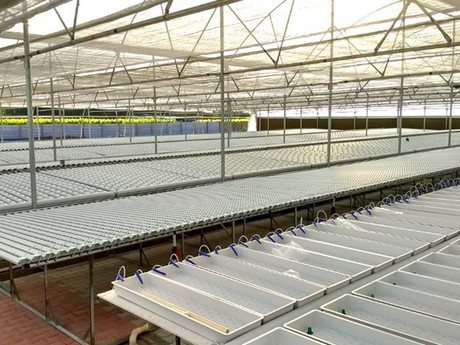Women in Controlled Environment Agriculture

Women in Controlled Environment Agriculture
CEA is Farming for Everyone
The number of women in Controlled Environment Agriculture (CEA) is growing. And why not. Women, since humans began to settle areas and grow crops, have played an active role in food production. It’s only in more recent history that traditional agriculture has been more of a male dominated industry. You know the “farmer’s wife” rather than the “farmer wife”. Even if women all over the world have been turning soil, planting seeds and harvesting crops–especially in times of war, when males were sent off to fight (although there have often been exceptions made for farmers, ie “essential workers).

So when it comes time to take over the family land, many people are choosing to dedicate a portion of the property to CEA, where they can still realize a family income growing food, except year round with less machinery and back work–ideal for women looking to diversify the family ag business.
CEA, in a Nutshell
Now during the present day, where land available to farm food is shrinking and populations continue to grow at exponential rates, we are seeing an increase in the number of urban farms, indoor agriculture operations and greenhouse crop producers. Modern and efficient high yield cropping set ups such as these are sometimes interchangeably referred to as Controlled Environment Agriculture–because people set the environment that crops grow under, rather than depending on nature. Naturally, this is done in a closed or semi-closed environment. So there you have it, CEA in a nutshell.

There’s no shortage of women in controlled environment agriculture worth talking about–from all facets of the industry, whether as owners, growers, marketing specialists, installers, financiers, etc.
However, there is one person that really comes to mind for us here at Grozine. That’s Jenny Harris, CEO of AmHydro (AKA American Hydroponics). Based out of Arcata, California USA, AmHydro has been in the business of helping growers for over 30 years. What makes Jenny Harris special to us is the fact that she has transitioned this well established outfit from the original owner and founder, Michael Christian, and made it grow–under challenges that could stop most of us in our tracks.
We spoke with Jenny about the current state of CEA and the increasingly active role women are taking in the industry at all levels-if anybody knows the industry, she does; doing business with growers in 66 different countries, and growing!
But before we get to that, we told you Jenny had more of a challenge than anyone would want to sign on for in taking the helm of AmHydro. Please read on to understand a little more about why we have developed an elevated level of respect for her in doing so. Would you have crumpled? We might have. An inspiring story in overcoming adversity.
Jenny’s Story, in Her Own Words

Sometimes life gently guides you into your destiny. For me, I was thrown head first in a sink-or-swim situation that became my pivotal, life-altering moment.
For almost 30 years my career included accounting, financial advising and business consulting and I enjoyed it. I joined American Hydroponics in 2011 as the Finance Director. While helping the founder sell off other parts of his larger business, he asked if I would be interested in buying the business along with another business partner, Scott Kornberg.
Scott had a lifetime of horticultural experience and a great love for growing. He was a natural fit to represent a company whose passion is helping growers succeed. We purchased AmHydro as equal partners in the beginning of 2015. Scott was the face of the company due to his deep ties in the industry and his great salesmanship while I ran the business side of things. 56 days into our partnership, Scott died suddenly on a Wednesday night. Apart from dealing with the tragedy of losing my friend and business partner, I lost the knowledge and connections into the industry of this company which I now helmed.
With a great team of employees, a product unsurpassed for quality and sustainability in our industry and a reputation for top notch customer and grower support, I stepped into one of our greenhouses. I was in the greenhouse every day working, learning and improving our systems with a novices’ eye. What worked well and what didn’t and how could we improve it. Along with jumping into greenhouse growing, I looked for the top talent in the industry and found the best. I hired Joe Swartz, who had been in the industry for 30+ years and had over 50,000 hours working in his commercial greenhouse growing produce for his community. Joe is the most knowledgeable and experienced grower in the hydroponic industry today.
Having spent 2-2.5 years stabilizing and improving the company after Scott’s death, we have come out of this a stronger company with a more efficient growing system than any other system on the market. We have installed a 5,000 sf commercial greenhouse as a learning center that people from around the globe have come to visit. It is operated by the Humboldt County Office of Education teaching vocational skills and entrepreneurship to high school students.
Learning how to grow hydroponically and experiencing the same thrills and challenges that all new growers go through has given me empathy for our new customers. AmHydro is fulfilling my passion to assist people in building a business in their community (wherever in the world their community is) that is able to provide safe, clean, living wage jobs while producing high quality, clean, delicious food. I, and all of our employees, are committed to helping each of our customers be successful in their growing endeavors. It might be a small backyard greenhouse that produces for your and your neighbors or a large multi-acre farm on a roof top in New York, Singapore or Seattle. Our goal is the same – successful growing for sustainable produce. With every system we manufacture, we have helped communities become self-sustaining. This is my passion, this is our company’s goal and this is AmHydro’s practice.
Here’s where we caught up with Jenny, taking some time out of a very busy schedule to help shed some light on Women in Controlled Environment Agriculture for us.
GZ-You mentioned doing business in over 66 countries–that’s quite an achievement on a lot of levels. With AmHydro being a global hydroponics provider, we’re thinking you might have some great insights with regards to CEA as well as the roles women take in the industry. What are some of the trends you have observed, with regards to women in controlled environment agriculture?
JH-CEA is an industry where women often stand at an active leadership role. It’s not traditional agriculture–there isn’t the heavy physical labor involved that is more common in traditional ag like field farming. So for a person who wants to get involved in agriculture and isn’t interested or wanting to do heavy physical work CEA is a natural fit.
One of the most notable trends I can share is a combination of the two areas I have mentioned. There are a significant number of women in controlled environment agriculture who head up non profit organizations that use cultivating crops in CEA on more levels than just the food or market value created.
For example, I work with women who have created non profit growing endevors that involve veterans, physically or mentally challenged people and others that might benefit from the type of growing and cultural practices that are involved with CEA. Besides teaching marketable skills, growing is very therapeutic and can be an integral part of any surrounding community. Who doesn’t appreciate a fresh vine ripened tomato in the dead of winter, right? Restaurants love having access to freshly harvested high quality culinary delights too. It seems women have a slightly stronger tendency towards working in a community setting. This is a great fit with CEA operations.
GZ-What do you feel are some of the more common challenges facing women in controlled environment agriculture?
JH-Financing is often the number challenge facing prospective CEA operators, and even more so with women.
As a trend, men tend to have a wider network or access to potential financing sources. Men may also have more experience at obtaining business loans or are more likely to know somebody who has. Interestingly, Contain Inc is a leader in the role of financing entrepreneurs seeking to enter the field of controlled environment ag–interesting because it was founded by a woman .
Contain Inc is a go-to with a great track record in helping growing enterprises get off the ground. They understand the business, whereas traditional financial institutions may still be a little in the dark, making getting financing even more challenging.
GZ–In terms of skill set with regards to women in CEA, what do you feel are some of the most important skills or qualities one should possess or develop if they are planning for success?
JH-From what I’ve seen in the industry, women just naturally seem to make better growers! I’ve noticed that female growers tend to be more detail orientated–they are quicker to notice a little spot of powdery mildew, for example. Male growers tend to have a stronger macro, big picture view of the operation while their female counterparts tend to scan for all the details.
Using modern technology, just about anybody can be a great grower. A really important area women also tend to accel in is sales, and that’s the real trick to making a CEA operation successful. Women seem to have an easier time identifying with a wider variety of people. This helps a lot from the sales aspect. Considering a single 30’ X 96’ greenhouse following our instructions using GroClean NFT channels can put out 10,400 heads of lettuce a month, being able to sell what you grow is key to success in operating as a business.
GZ–Do you see a lot more women in controlled environment agriculture in coming years?
JH-Yes, for sure. The average age of a mainstream ag farmer is 68 years old in North America. A lot of their kids don’t want to work the farm like their parents did, but want to keep the legacy going in their own way.
So when it comes time to take over the family land, many people are choosing to dedicate a portion of the property to CEA, where they can still realize a family income growing food, except year round with less machinery and back work–ideal for women looking to diversify the family ag business.
CEA is sometimes just a part of their plan, which may include more community based endevors like having u-pick pumpkin patches, offering Christmas trees, hay rides and the like. A lot of women in controlled environment agriculture do well turning the family farm into a sort of community hub. In some instances, this becomes multi generational too. Just a new twist from women in controlled environment agriculture.
GZ–If you could give just one piece of advice to women reading this article, or anyone for that matter, who is thinking about entering CEA as a profession, what would it be?
JH-Easy, take a class or seminar. Make sure you get in the greenhouse and get a hands on feel for things before you get too far ahead. You’ll be better prepared for being able to make the important types of decisions needed when starting out. Get a feel for it first hand! AmHydo is just one of many providers of good classes and seminars. We love hearing from new people excited about growing.

The post Women in Controlled Environment Agriculture appeared first on GROZINE.

